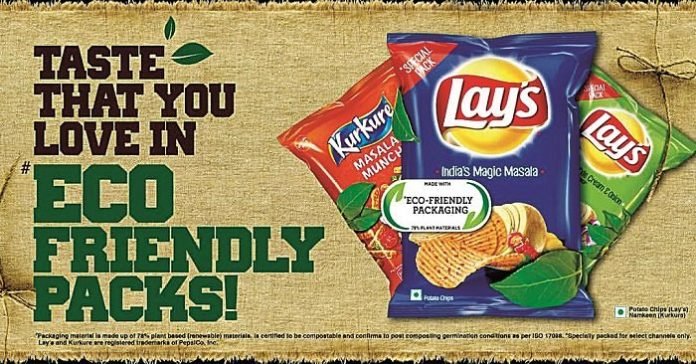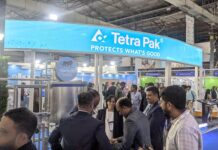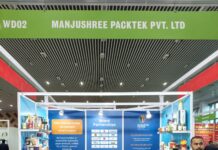PepsiCo India has rolled out a six-month pilot program to sell its snack products in compostable packaging, as reported by the Economic Times. The FMCG major will pilot the first-ever 100% compostable, plant-based packaging for its popular Lay’s and Kurkure snacks products. India is among the first countries to pilot this new, sustainable packaging solution developed by PepsiCo. The new packaging is bio-based, made from plant-based material and is 100% compostable.
According to the Economic Times, Lay’s and Kurkure packed in the new compostable material will be available at Delhi’s Indira Gandhi International Airport Terminal 3. The 100% compostable packaging can be disposed of with regular food waste and will take 12 weeks to decompose under industrial composting conditions.
“Through this pilot, we aim to influence and study consumer behavior, as well as monitor the waste management channel in a controlled environment,” said Jagrut Kotecha, vice president – Snacks Category, PepsiCo India.
Apart from this latest initiative, PepsiCo India has been involved in a number of projects to address the issue of sustainability and plastic packaging waste in India. The company has worked closely with the Central Pollution Control Board to implement projects for collection, segregation, and recycling of post-consumer multilayered packaging waste. For instance, through its pilot in Gujarat with Nepra, PepsiCo recovered and recycled plastic waste equivalent to 100% of the multi-layered packaging waste generated by its snacks products in the state. It has also piloted a ‘Film to Fuel’ project at its Pune plant to convert all the packaging film waste from the plant, into fuel, ensuring 100% recycling of packaging waste at the plant.
Global initiatives
PepsiCo, the parent company of PepsiCo India, is part of multiple initiatives at the global level as well to address the issue of plastic waste. The company in October 2018 said as part of its sustainable plastics vision, it will strive to use 25% recycled content in its plastic packaging by 2025. PepsiCo aims to achieve this goal by collaborating with suppliers and partners, helping to increase consumer education, fostering cross-industry and public-private partnerships, and advocating for improved recycling infrastructure and regulatory reform. The goal includes an aim specific to polyethylene terephthalate (PET) beverage bottles to achieve 33% recycled PET content by 2025.
PepsiCo said its new goal builds on goals announced in 2016 under the company’s Performance with Purpose 2025 Agenda. The 2025 Agenda included goals for PepsiCo to strive to design 100% of its packaging to be recyclable, compostable or biodegradable; to increase its use of recycled materials; to reduce the carbon impact of its packaging; and, in partnership with the PepsiCo Foundation, to work to increase recycling rates.
PepsiCo has made a number of recent announcements in support of its sustainable plastics vision and related Performance with Purpose 2025 Agenda goals.
Also in October 2018, PepsiCo entered into a multi-year supply agreement with Canada-based Loop Industries to incorporate Loop PET plastic, which is 100% recycled material, into its product packaging by mid-2020. Loop’s chemical recycling technology allows for low value plastics to be diverted, recovered and recycled continuously into new, virgin-quality plastic.
In September 2018, PepsiCo announced it would collaborate in the Global Plastic Action Partnership (GPAP), led by the World Economic Forum, which will work with stakeholders in coastal economies, including in South-East Asia, to show how businesses, communities and governments can redesign their waste management systems to create a circular model. In July 2018, The PepsiCo Foundation and non-profit, The Recycling Partnership, announced the launch of ‘All in on Recycling’, the largest ever industry-wide residential recycling challenge to make it easier for 25 million families across the US to recycle.
Other major brands step us as well

are developing recyclable and
compostable cup solutions
Just like PepsiCo, other major global consumer brands have stepped up to address the issue of sustainability and packaging waste. Earlier this year, world’s two biggest consumer brands, Starbucks and McDonald’s, agreed to drive innovation of their packaging and help reduce waste. McDonald’s has joined Starbucks to lead the NextGen Cup Consortium, which has launched the NextGen Cup Challenge to help develop a global recyclable and compostable cup solution.
The Challenge kicked off in September and invites innovators, entrepreneurs, industry experts, and recyclers to submit their ideas for the next generation of recyclable and compostable cups. Awardees will receive acceleration funding up
to US$ 1 million based on key milestones. Up to seven of the awardees will enter
a six-month accelerator program to help scale their solutions. Shortlisted candidates will be announced on 10 December 2018.
NextGen could prove to be a critical step in the development of a global end-toend solution that will potentially allow the 600 billion cups globally to be diverted from landfills and given a second life. NextGen is building a robust advisory council including leaders in environmental NGOs, such as WWF, human-centered design, academic leaders, the paper and plastic industry, recyclers, composters, and municipalities to ensure that the work is grounded in the needs of the entire value chain and the cups make it from shelf to consumer and back through the recovery system to another high value use.











